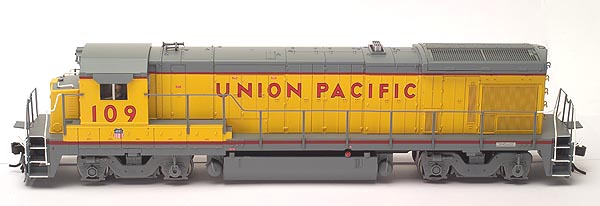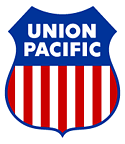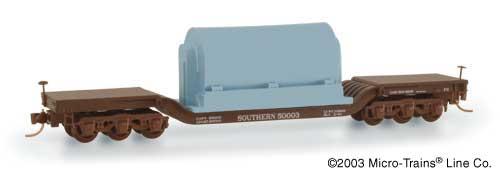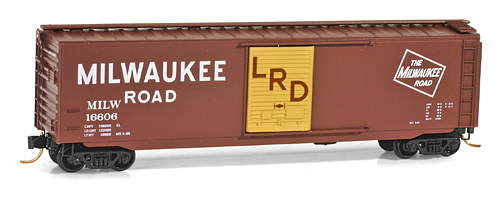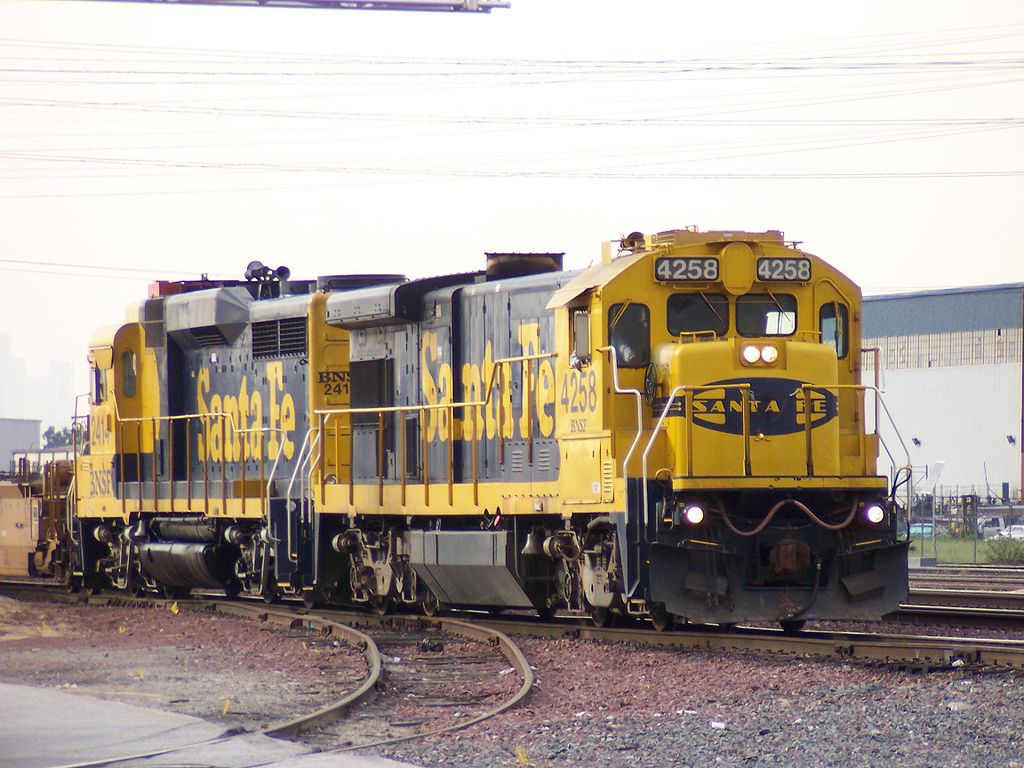Model Information: The Atlas B23-7 was first released in October of 2000. It shares a mechanism with the B30-7 which was released the following year (2001). The B36-7 also shares the same mechanism. The shells of the B23-7 and B30-7 are very very similar and only differ in some minor details. This is a "modern" mechanism with a split-frame, all-metal chassis, 5-pole / skew-wound motor with dual flywheels, low-friction drive, bi-directional LED lighting, all-wheel drive and pickup (no traction tires), blackened / low-profile wheels, shell-mounted Accumate couplers, and all-plastic gearing.
Starting with the 2005 production run, these models were upgraded to include "scale speed" motors and golden-white lighting.
Features:
Fat or thin anticlimber, knuckle or button battery boxes, FB-2, AAR or Blomberg trucks, low or high nose, flat or protruding headlight, 2 or 4 window cab.
Starting with the 2005 production run, these models were upgraded to include "scale speed" motors and golden-white lighting.
Features:
- Directional lighting
- Painted safety rails
- Blackened metal wheels
- Cab sunshades
- Dual flywheel equipped 5-pole skewed armature motor with a low friction mechanism
Fat or thin anticlimber, knuckle or button battery boxes, FB-2, AAR or Blomberg trucks, low or high nose, flat or protruding headlight, 2 or 4 window cab.
DCC Information: Offered in two variations:
One with a factory-installed Lenz decoder and the other with a PC board designed for easy conversion to DCC.
One with a factory-installed Lenz decoder and the other with a PC board designed for easy conversion to DCC.
Prototype History: The GE B23-7 is a diesel locomotive model that was first offered by GE in late 1977. Featuring a smaller 12 cylinder version of the FDL engine, it is the successor to GE's U23B produced from early 1968 to mid 1977, but at 62 ft 2 in (18.95 m) long is exactly 2 ft 0 in (0.61 m). longer. It competed with the very successful EMD GP38-2. General Electric also produced a variant, the BQ23-7, no.5130-5139, for the Seaboard Coast Line. A total of 537 B23-7's were built for 9 U.S. customers and 2 Mexican customers.
A B23-7A is a 12-cylinder B23-7 with horsepower boosted to 250 per cylinder or 3,000 horsepower. In 1980 the Missouri Pacific ordered three B23-7A's (#'s 4667-4669, later UP #'s 257-259) and tested them system-wide. The result was the GE model B30-7A, B30-7 with a 12-cylinder FDL prime mover. They were not renumbered into the B30-7A series on the MP because they lacked Sentry Wheel Slip and had different engine governors.
13 B23-7's were built by GE of Brazil in Dec.1979 for United South Eastern Railways(FUS) no.522-524 and National Railways of Mexico(NdeM) no.9130-9139. 17 B23-7s were built from GE kits in Mexico as Ferrocarriles Nacionales de México no.10047-10052 and no.12001-12011.
From Wikipedia
Read more on American-Rails.com.
A B23-7A is a 12-cylinder B23-7 with horsepower boosted to 250 per cylinder or 3,000 horsepower. In 1980 the Missouri Pacific ordered three B23-7A's (#'s 4667-4669, later UP #'s 257-259) and tested them system-wide. The result was the GE model B30-7A, B30-7 with a 12-cylinder FDL prime mover. They were not renumbered into the B30-7A series on the MP because they lacked Sentry Wheel Slip and had different engine governors.
13 B23-7's were built by GE of Brazil in Dec.1979 for United South Eastern Railways(FUS) no.522-524 and National Railways of Mexico(NdeM) no.9130-9139. 17 B23-7s were built from GE kits in Mexico as Ferrocarriles Nacionales de México no.10047-10052 and no.12001-12011.
From Wikipedia
Read more on American-Rails.com.
Road Name History: The Union Pacific Railroad (reporting mark UP) is a freight hauling railroad that operates 8,500 locomotives over 32,100 route-miles in 23 states west of Chicago, Illinois and New Orleans, Louisiana. The Union Pacific Railroad network is the largest in the United States and employs 42,600 people. It is also one of the world's largest transportation companies.
Union Pacific Railroad is the principal operating company of Union Pacific Corporation (NYSE: UNP); both are headquartered in Omaha, Nebraska. Over the years Union Pacific Corporation has grown by acquiring other railroads, notably the Missouri Pacific, Chicago & North Western, Western Pacific, Missouri-Kansas-Texas, and the Southern Pacific (including the Denver & Rio Grande Western).
Union Pacific Corporation's main competitor is the BNSF Railway, the nation's second largest freight railroad, which also primarily services the Continental U.S. west of the Mississippi River. Together, the two railroads have a duopoly on all transcontinental freight rail lines in the U.S.
Read more on Wikipedia and on Union Pacific official website.
Union Pacific Railroad is the principal operating company of Union Pacific Corporation (NYSE: UNP); both are headquartered in Omaha, Nebraska. Over the years Union Pacific Corporation has grown by acquiring other railroads, notably the Missouri Pacific, Chicago & North Western, Western Pacific, Missouri-Kansas-Texas, and the Southern Pacific (including the Denver & Rio Grande Western).
Union Pacific Corporation's main competitor is the BNSF Railway, the nation's second largest freight railroad, which also primarily services the Continental U.S. west of the Mississippi River. Together, the two railroads have a duopoly on all transcontinental freight rail lines in the U.S.
Read more on Wikipedia and on Union Pacific official website.
Brand/Importer Information: In 1924 Stephan Schaffan, Sr. founded the Atlas Tool Company in Newark, New Jersey. In 1933 his son, Stephan Schaffan, Jr., came to work for his father at the age of sixteen. Steve Jr. built model airplanes as a hobby and frequented a local hobby shop. Being an enterprising young man, he would often ask the owner if there was anything he could do to earn some extra spending money. Tired of listening to his requests, the hobby-store owner threw some model railroad track parts his way and said, "Here, see if you can improve on this".
In those days, railroad modelers had to assemble and build everything from scratch. Steve Jr. created a "switch kit" which sold so well, that the entire family worked on them in the basement at night, while doing business as usual in the machine shop during the day.
Subsequently, Steve Jr. engineered the stapling of rail to fiber track, along with inventing the first practical rail joiner and pre-assembled turnouts and flexible track. All of these products, and more, helped to popularize model railroading and assisted in the creation of a mass-market hobby. The budding entrepreneur quickly outgrew the limitations of a basement and small garage operation. Realizing they could actually make a living selling track and related products, Steve and his father had the first factory built in Hillside, New Jersey at 413 Florence Avenue in 1947. On September 30, 1949, the Atlas Tool Company was officially incorporated as a New Jersey company.
In 1985, Steve was honored posthumously for his inventions by the Model Railroad Industry Association and was inducted into the Model Railroad Industry Hall of Fame in Baltimore, Maryland. In addition, Steve was nominated and entered into the National Model Railroad Association Pioneers of Model Railroading in 1995.
In the early 1990s, the Atlas Tool Company changed its name to Atlas Model Railroad Company, Inc.
In those days, railroad modelers had to assemble and build everything from scratch. Steve Jr. created a "switch kit" which sold so well, that the entire family worked on them in the basement at night, while doing business as usual in the machine shop during the day.
Subsequently, Steve Jr. engineered the stapling of rail to fiber track, along with inventing the first practical rail joiner and pre-assembled turnouts and flexible track. All of these products, and more, helped to popularize model railroading and assisted in the creation of a mass-market hobby. The budding entrepreneur quickly outgrew the limitations of a basement and small garage operation. Realizing they could actually make a living selling track and related products, Steve and his father had the first factory built in Hillside, New Jersey at 413 Florence Avenue in 1947. On September 30, 1949, the Atlas Tool Company was officially incorporated as a New Jersey company.
In 1985, Steve was honored posthumously for his inventions by the Model Railroad Industry Association and was inducted into the Model Railroad Industry Hall of Fame in Baltimore, Maryland. In addition, Steve was nominated and entered into the National Model Railroad Association Pioneers of Model Railroading in 1995.
In the early 1990s, the Atlas Tool Company changed its name to Atlas Model Railroad Company, Inc.
Item created by: trainnut3500 on 2017-01-03 17:10:58
If you see errors or missing data in this entry, please feel free to log in and edit it. Anyone with a Gmail account can log in instantly.
If you see errors or missing data in this entry, please feel free to log in and edit it. Anyone with a Gmail account can log in instantly.


